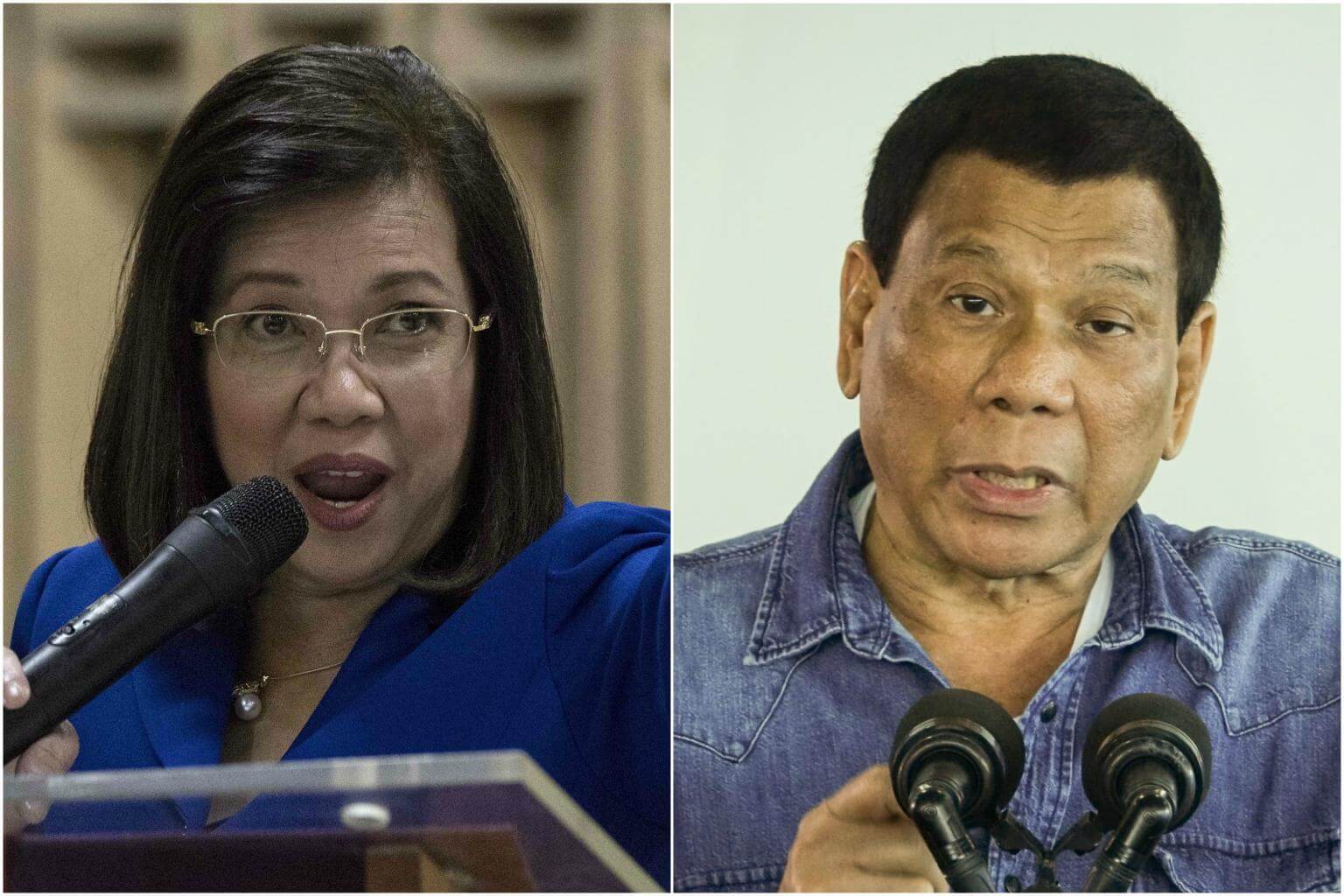The messy fight between Duterte and his chief justice: Inquirer
In its editorial, the paper examines the ongoing tussle between President Rodrigo Duterte and Philippine Chief Justice Maria Lourdes Sereno to say the independence of the judiciary is at stake.
Sign up now: Get insights on Asia's fast-moving developments

President Rodrigo Duterte (right) called Chief Justice Maria Lourdes Sereno of the Supreme Court an "enemy," and vowed he would remove her from office.
PHOTOS: AFP, EPA-EFE
Follow topic:
MANILA (PHILIPPINE DAILY INQUIRER/ASIA NEWS NETWORK) - President Duterte has taken the velvet glove off the iron hand.
Before he left for the Boao Forum in China, he called Chief Justice Maria Lourdes Sereno of the Supreme Court an "enemy," and vowed he would remove her from office.
"I'm putting you on notice that I'm your enemy and you have to be out of the Supreme Court," an angry President said in a news conference.
"I will see to it and after that, I will request the Congress go into the impeachment right away."
What triggered the President's outright declaration of enmity? What provoked his declaration of political war?
Sereno - forced to go on indefinite leave from the Court by an unwieldy coalition of justices, facing both a patently unconstitutional quo warranto proceeding before the Court and certain impeachment in the House of Representatives - has been accepting unending invitations to speak in all sorts of public forums, and in the last one she raised the obvious question: If the President says he is not behind the twin moves to oust her, why was it Solicitor General Jose Calida, the government's chief lawyer and a close ally of the President's, who filed the quo warranto case against her?
Even in the polite Filipino she used, there was no mistaking the direct challenge she had laid at the President's door: "Mr. President, kung sinabi mong wala kang kinalaman dito, paki paliwanag po bakit si SolGen Calida na nagrereport sa 'yo ang nag-file ng quo warranto?" (Mr President, if as you said you have no hand in this, please explain why Solicitor General Jose Calida, who reports to you, filed the quo warranto).
President Duterte took personal offense. In a mix of Filipino and English, he said: "You, Sereno, I told you I did not interfere. If you are insisting, then count me in. Count me in and I will egg Calida to do his best. I myself will do it, fight you."
And again: "I was telling you that I did not interfere. Now look what you've done, talking and talking, I will beat you up. I will help any investigator."
And, one last time: "Now I will really get involved. I am asking Congress: What's taking you too long? Do not create any crisis in this country. I will not hesitate to do what is to the best interest of my country. If it calls for your forced removal, I will do it."
It is no secret that Sereno has been on the wrong side of the President's personal ledger since she defended the independence of the judiciary when, at the start of the President's signature campaign against drugs, he pinpointed judges he said were implicated in the illegal drug trade.
Speaking for the Supreme Court, Sereno calmly welcomed the President's allegations but firmly insisted that the judiciary, being a branch of government designed to be independent of the two political branches, must follow its own procedures in determining the guilt or innocence of any accused judges. It was downhill from there.
There was even an exchange of views that led the President to exclaim, "Or would you rather I will declare martial law?"
Since August 2016, when the two heads of coequal branches of government conducted what amounted to a debate held through public forums or press conferences, Sereno had always sought not to directly challenge the President.
Her statements, while growing increasingly sharp, were still couched in polite diplomatic language.
Her speech last Monday directly challenging the President was a departure from previous practice - and it must have been deliberate.
The question then is: Why did Sereno seemingly sign her own death warrant, so to speak, by taking on the President?
Because it sharpens the issues facing Sereno. The impeachment complaint in Congress was of course a political stratagem; how else could an incoherent complaint filed by an incompetent lawyer survive a lengthy proceeding if not for the political will of the leaders running the proceeding?
Now the President himself has confirmed that he wants the House of Representatives to hurry up.
Sereno has reached the point where the only possibility of legal and constitutional salvation lies in an impeachment trial in the Senate.
By provoking the President, she has succeeded in forcing the hand of the House.
But why was the House taking so long, when impeachment is a foregone conclusion?
Because House leaders are waiting for the Supreme Court to take the unconstitutional option of unseating an official identified by the Constitution as removable only by impeachment through another means - the quo warranto case.
Sereno's challenge has led the President to paint the justices into a corner. If they oust her, whatever reasons they use, they will be seen, forever, as mere errand boys and girls, carrying out the command of an angry executive.
The Philippine Daily Inquirer is a member of The Straits Times media partner Asia News Network, an alliance of 23 news media entities.

